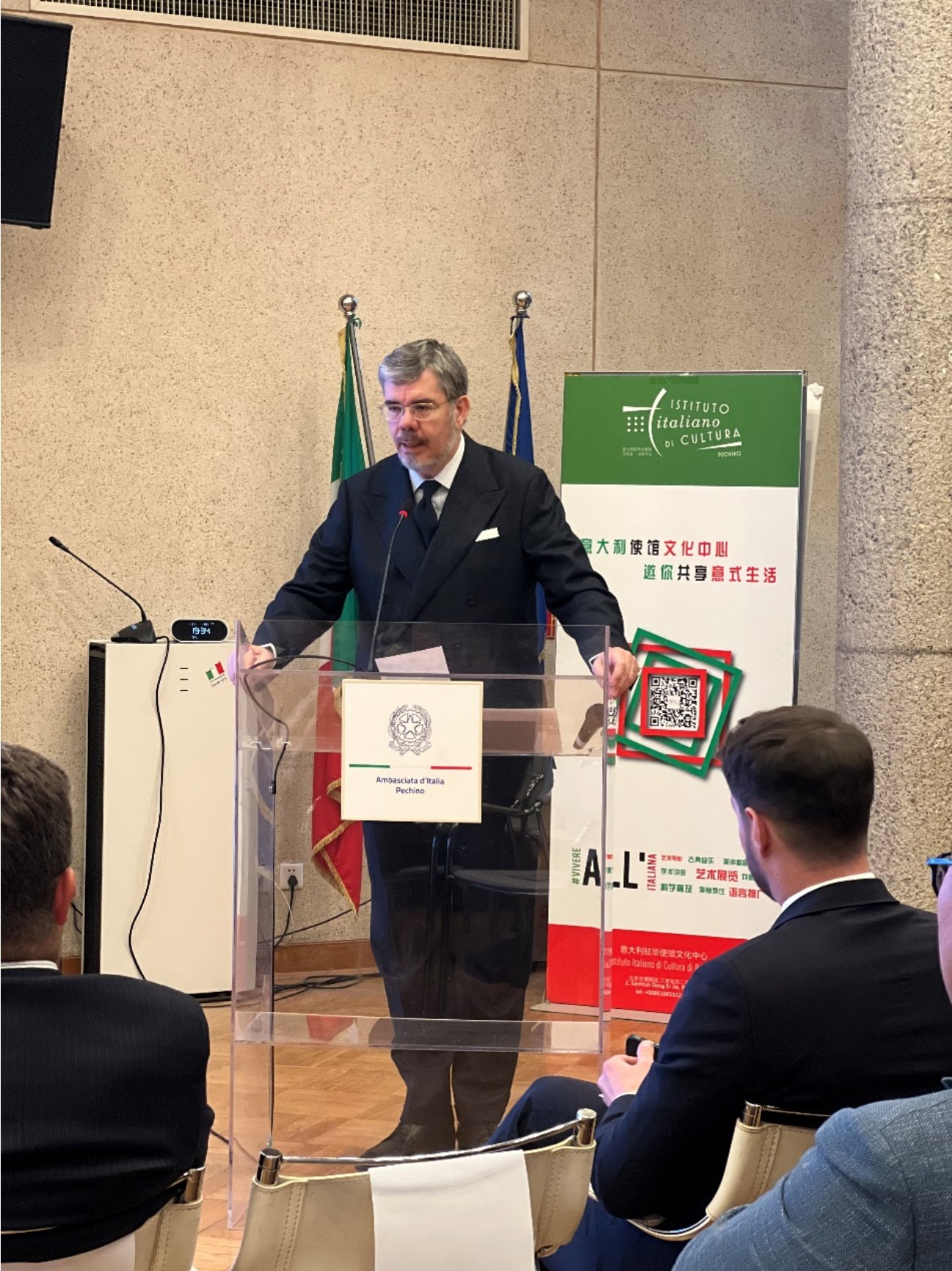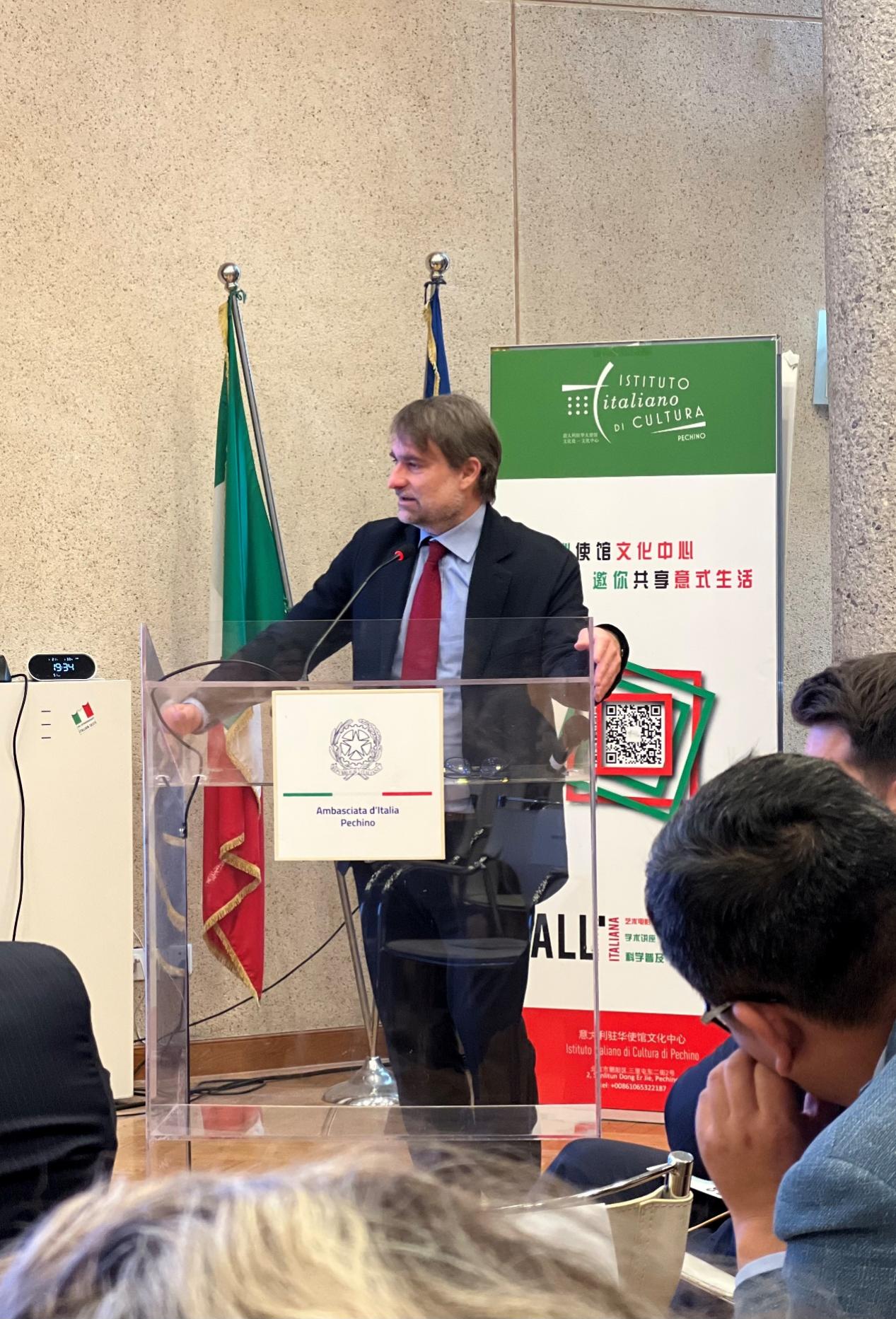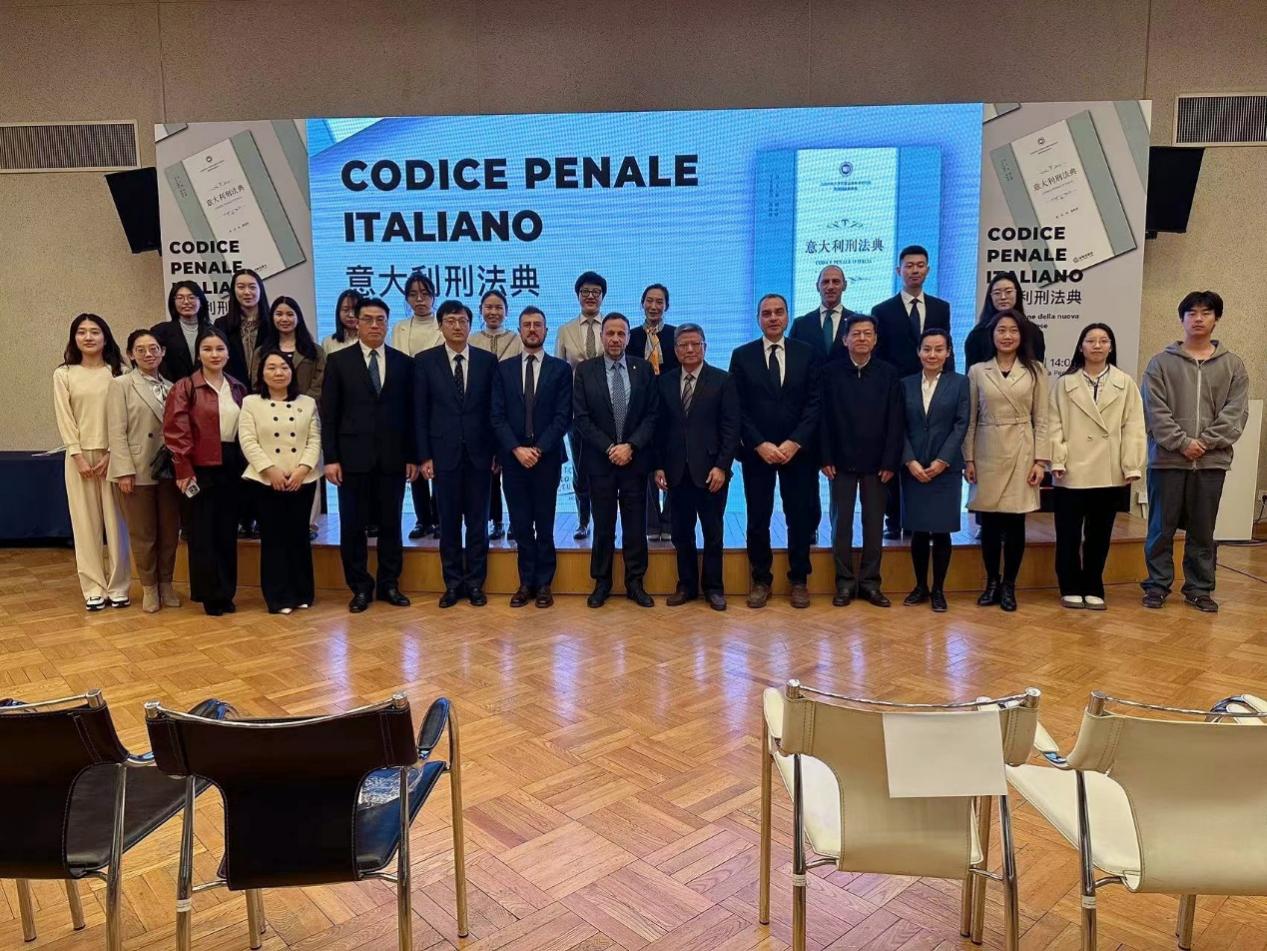
On the 2nd of April, the Italian Embassy in China hosted a seminal event to unveil the latest Chinese translation of the Italian Criminal Code. Leveraging the release as a catalyst for fostering academic dialogue on criminal justice between China and Italy, the embassy extended invitations to the translators of the code, Professor Huang Feng and Associate Professor Yang Chao from the Law School and College for Criminal Law Science of Beijing Normal University, to engage in the proceedings. The event drew a diverse audience of over 70 attendees, including representatives from the EU Embassy in China, the Supreme People's Court, the Supreme People's Procuratorate, the Ministry of Public Security, the Ministry of Justice, prominent law firms, and members of the editorial and compilation committees for the "Beijing Normal University Foreign Criminal Code Translation Series." Also present were academic dignitaries from the National Judges College, Law Press, Beijing Normal University, Yunnan Normal University, and other institutions. Moreover, the event featured remote participation from esteemed faculty and students across several Italian universities, such as the Italian Judges Training Institute, the Luiss University-Rome, the Sapienza University of Rome, the Tor Vergata University of Rome and the University of Milan. The event was moderated by Raffaello GIROTTO, the Legal Attaché of the Italian Embassy in China.
Opening the proceedings, Mr. Massimo AMBROSETTI, the Italian Ambassador to China, delivered an inspiring welcome address. The Ambassador highlighted the rich legacy of legal and cultural exchanges between China and Italy, underscoring that the publication of the new Chinese translation of the Italian Criminal Code marks a significant milestone in the ongoing dialogue between the two nations. He expressed his hope that this achievement would serve as a robust bridge for further legal and cultural interchange. Ambassador AMBROSETTI also voiced his aspirations for continued collaboration and exchange in areas such as justice, economy, and culture in the future.

Professor Federico ANTONELL, Director of the Cultural Center at the Italian Embassy in China, noted that this marks the third iteration of the Chinese translation of the Italian Criminal Code. He expressed profound gratitude to the Chinese criminal law scholars for their invaluable contributions to the Italian Criminal Code. Italy, he emphasized, has consistently prioritized legal exchanges with China, spanning areas such as civil law, contract law, and criminal law. The Chinese translation of the Italian Criminal Code not only facilitates a deeper comprehension of each other's legal frameworks and cultural contexts among legal professionals from both nations but also fortifies the friendly cooperation between Italy and China. This endeavor, he believes, holds significant importance for the continued development of both countries.


The second session of the activity featured speeches by Chinese scholars and translators. Firstly, the host read out the congratulatory letter sent by Professor Gao Mingxuan, Honorary President of the Chinese Criminal Law Research Association and Academic Advisor of the "Foreign Criminal Code Translation Series". In his congratulatory message, Professor Gao Mingxuan congratulated the successful publication of the new Chinese version of the Italian Criminal Code. He mentioned that Italy is the birthplace of modern criminal law. At the same time, compared with other European countries, China and Italy started legal academic exchanges earlier. In the 1980s, through the visit of Mr. Jiang Ping, the then president of China University of Political Science and Law, to Italy, a mechanism for Sino Italian legal exchange and cooperation was established. As a result, the exchange and cooperation between the two sides gradually deepened, cultivating a group of excellent legal talents for China. Professor Gao Mingxuan also expressed the hope to continue the tradition of mutual exchange and learning between Italian and Chinese criminal law studies, and to continue closer exchanges in the future.
Mr. Hu Yunteng, Chief Justice of the Supreme People's Court and Editor-in-Chief of the "Foreign Criminal Code Translation Series," aspires to utilize the translation of the Criminal Code as a catalyst for advancing criminal law studies between China and Italy. Justice Hu Yunteng underlined that the history of criminal law exchange between our two nations is rich and marked by significant accomplishments. Both countries share common interests and offer distinct perspectives on various criminal law issues. Enhancing communication and cooperation, he believes, will foster a deeper integration and dialogue between our legal systems.
Professor Huang Feng of the Law School and College for Criminal Law Science at Beijing Normal University, in his capacity as a translator, addressed the subject of "Italian Criminal Law Through the Lens of Chinese Legal Scholars." His presentation not only provided a macroscopic view of the decades-long history of academic and judicial collaboration between China and Italy but also highlighted the milestones achieved through their partnership. Additionally, from a microscopic perspective, he delved into the contrasting ethical viewpoints on the application of the death penalty in China and Italy. Using the Italian Criminal Code's "mafia-type group" charge and the Chinese Criminal Code's "organized crime with mafia nature" as case studies, Professor Huang Feng examined and elucidated the similar criminal policies, legislative techniques, and penal measures employed by both countries in adhering to international conventions, fulfilling their legal obligations as member states, and combating transnational organized crime. In conclusion, Professor Huang Feng asserted that the blend of rigidity and flexibility, coupled with the intrinsic rationality of Italian criminal law, has established a solid foundation for Sino-Italian legal exchange and scholarship.
Professor Zhou Zhenjie, a distinguished faculty member at the Law School and College for Criminal Law Science of Beijing Normal University, and a representative of the editorial board for the "Foreign Criminal Code Translation Series," articulated in his address the aspiration to advance the modernization of criminal law through the translation of international criminal codes. He emphasized that by translating and absorbing the core principles of criminal laws from various nations, we can address the deficiencies in our own legal system, foster the modernization of legal infrastructure, and simultaneously contribute to the global advancement of the rule of law.
Ms. Zhu Feng of the Law Press delivered a speech titled "Fostering a Bridge Between Domestic and International Legal Studies and Sharing Legal Insights." She highlighted the Law Press's ongoing dedication to facilitating the exchange of legal knowledge between China and the international community, expressing hope that the newly published edition of the Italian Criminal Code would serve as a vital resource for comprehensive criminal law study across various sectors.
Associate Professor Yang Chao from the Law School and College for Criminal Law Science at Beijing Normal University also spoke, beginning by expressing gratitude for the enduring and fruitful academic exchanges between China and Italy. These exchanges, he noted, have enabled successive generations of young scholars to engage and learn within diverse cultural contexts and perspectives, thereby enhancing mutual understanding and trust between the two nations. Following this, Associate Professor Yang Chao delved into an analysis of Italy's legislative approach to combating mafia-style criminal groups, as reflected in the Italian Criminal Code's treatment of "mafia-style criminal groups." He also discussed the recent trend in Italian criminal legislation to emphasize economic sanctions as a means to punish mafia-style criminal organizations.
During the third segment of the event, three esteemed professors from Italian universities elucidated on the evolution of the Italian Criminal Code from their respective vantage points. Professor Antonino GULLO of the Luiss University-Rome presented a lecture entitled "Italian Anti-Bribery Legislation: Prevention and Prosecution." He commenced by highlighting how the translation of the Italian Criminal Code into Chinese has facilitated dialogue, surmounted linguistic and other obstacles, and streamlined criminal legal cooperation. Professor GULLO then proceeded to offer a comprehensive synopsis of Italy's contemporary anti-corruption legislative framework, detailing the measures and regulations in place to combat corruption within the public sector, as well as the criminal law dimensions. Professor Stefano MANACORDA from the University of Naples Federico II concentrated on the legislative progression of criminal liability for the protection of cultural heritage within the Italian legal system. He noted that Italy and China stand as the two leading nations in the world in terms of cultural heritage, emphasizing that enhancing the criminal law perspective on the protection against cultural property violations is profoundly significant for both nations. Finally, Professor Stefano ZIRULIA from the University of Milan delved into the cutting-edge features and penal strategies for environmental crimes as stipulated in the Italian Criminal Code, shedding light on the latest developments in criminal legislative techniques aimed at environmental protection.

Amidst an ambiance of warm and amicable interaction, both in person and virtually, the event introducing the new Chinese translation of the Italian Criminal Code was brought to a successful close.
